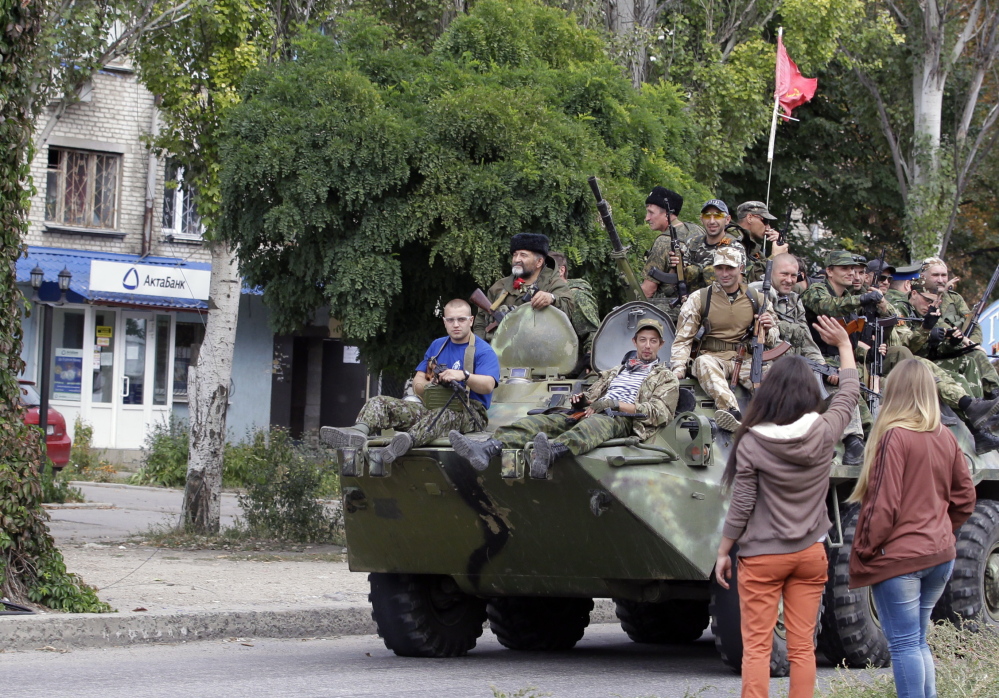LUHANSK, Ukraine — Months of daily shelling reduced this city to a ghost town, silent but for the explosions.
On Sunday, following a cease-fire signed Sept. 5, residents in the second-largest city held by pro-Russian rebels in east Ukraine emerged in a rare show of jubilation that was half celebration, half simply relief at the reprieve in the violence.
The same wasn’t true of the largest rebel stronghold of Donetsk, where fighting around the government-held airport has caught many residential neighborhoods in the crossfire.
Ukrainian National Security and Defense Council spokesman Volodymyr Polyovyi told journalists that government troops had repelled an attack on the airport by about 200 fighters.
The cease-fire deal has been riddled by violations from the start, and both sides have made it clear that they are regrouping and rearming in case the fighting starts anew.
Ukrainian President Petro Poroshenko and German Chancellor Angela Merkel spoke by phone late Sunday and “expressed concern about violations of the cease-fire regime,” according to the Ukrainian leader’s website.
In Crimea, the Black Sea peninsula that Russia annexed from Ukraine in March, residents voted for regional parliamentary elections dominated by Russian President Vladimir Putin’s backers, although the results weren’t yet available.
Ukrainian Defense Minister Valeriy Heletey said that delivery of weapons from NATO countries, agreed upon earlier this month, was “under way.”
But despite repeated violations of the cease-fire and tough talk on all sides, the peace deal has allowed for a return to some kind of normalcy for cities like Luhansk, as shell-shocked residents come to grips with the damage incurred by nearly five months of fighting.
Luhansk’s population of about 250,000 people, reduced because of the war, celebrated “city day” on Sunday, which opened on a somber note as priests led prayers in commemoration of those killed during a government-mounted siege of the city.
Damage to basic infrastructure left much of the city without power and water since August. Around Luhansk, smashed windows, burned-out buildings and craters in the road are testimony to an imprecise, often indiscriminate shelling campaign.
After a garbage recycling plant was damaged, trash began piling up on the streets. But while the damage remains, the streets have begun to be cleared away and electricity has returned to some parts of the city as the fragile peace sets in.
Local separatist leader Igor Plotnitsky mourned those who had been killed and in an unusually conciliatory statement called for forgiveness for those responsible.
A Russian aid convoy carrying mainly food arrived in Luhansk on Saturday, and men in camouflage standing under a scratched-out sign reading “Strong Ukraine” on Sunday were handing out relief supplies to a large crowd of residents patiently waiting in line. War veterans were poured complimentary shots of vodka.
As the men in fatigues handed out wares, their guns lay nearby, some propped up against the wall. Their efforts appeared as much an aid initiative as a public relations exercise necessary to prop up local support in a city where the rebel presence has caused such intense misery.
Copy the Story LinkSend questions/comments to the editors.



Success. Please wait for the page to reload. If the page does not reload within 5 seconds, please refresh the page.
Enter your email and password to access comments.
Hi, to comment on stories you must . This profile is in addition to your subscription and website login.
Already have a commenting profile? .
Invalid username/password.
Please check your email to confirm and complete your registration.
Only subscribers are eligible to post comments. Please subscribe or login first for digital access. Here’s why.
Use the form below to reset your password. When you've submitted your account email, we will send an email with a reset code.